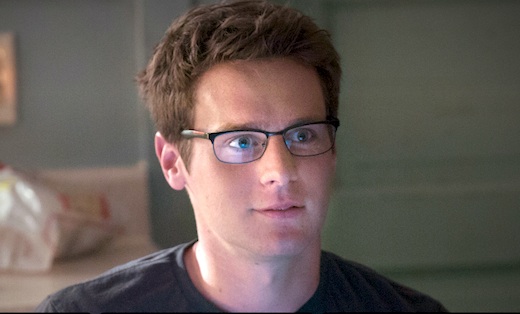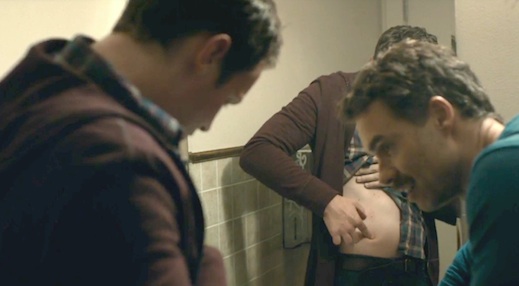
After the promising season two premiere of HBO’s Looking, I had high expectations for the new episode, “Looking for Results.” It pains me to say I found the show tedious. What’s worse, details in the plot about an HIV test could misinform viewers about the test and their own HIV risk.
But first, a quick recap for our purposes. See if you note the problematic elements.
Patrick (Jonathan Groff, pictured above) is having a secret affair with his boss, Kevin (Russell Tovey), who has a boyfriend. The show opens with them enjoying an intimate tryst at a hotel. Later, Patrick develops a slight bump on his stomach. It could be one of those inexplicable skin problems that go away. Then again, he thinks, it could be bedbugs--or AIDS. Soon, Patrick spirals into what the show calls “AIDS Panic”--an irrational fear of having the virus, apparently not an uncommon panic for Patrick. Soon, he’s engrossed in online images of rashes; when his friend Dom (Murray Bartlett) refuses to feed into his anxiety, Patrick calls a help line to talk with a specialist. Eventually Patrick gets an HIV test. While talking with the tester, Patrick admits that he did in fact have unprotected sex, just once, six weeks ago.
“I’m pretty sure [Kevin’s] negative,” Patrick says to the tester. “And when he came, he came on my body, not in myself, so I think I should be fine. But I’m sorry, I don’t know why I did it.”
Nonplussed, the tester just says, “People make mistakes.”
“So these tests find the virus pretty quick, right?” Patrick asks.
“We don’t test for the virus itself,” the tester answers, “we test for the body’s response to the virus, the way a pregnancy test measures the body’s response to a baby.”
To which Patrick jokes to himself, “Hey everyone, I’m pregnant...with HIV.”
But of course, he’s not “pregnant.” Patrick delivers the “I’m negative” news to Kevin, who is surprised about the clandestine HIV test. As they talk, it becomes evident that Patrick’s anxiety about their secret relationship has been displaced as fears of HIV. Turns out, Kevin’s freaking out too, and he promises to try to be more open with Patrick, which he illustrates by doing a cute little dance.
For more insight into this episode, I listened to the show’s related podcast, Talking, and watched some behind-the-scenes interviews on the HBO website.
Michael Lannan, the show’s creator and executive producer, says: “I think most gay men have a moment when they think, ’What if I am positive?’ and it can spiral into irrational fears. HIV is this thing that can become a fearful monster instead of a medical condition.” Lannon goes on to say he had a friend who called an operator over AIDS panic, just like Patrick did in the show. (Below is Patrick showing Dom the tiny bump that might be AIDS.)
 Lannan also said he was nervous about how the episode would be viewed among long-term survivors of the epidemic, so he asked several if they resented irrational AIDS panic, and they said, “No, HIV is still an issue, so there will still be panic.” In Looking, this group is represented by likable character Lynn (Scott Bakula). When Dom asks Lynn if he’s offended by irrational AIDS panic, Lynn says No.
Lannan also said he was nervous about how the episode would be viewed among long-term survivors of the epidemic, so he asked several if they resented irrational AIDS panic, and they said, “No, HIV is still an issue, so there will still be panic.” In Looking, this group is represented by likable character Lynn (Scott Bakula). When Dom asks Lynn if he’s offended by irrational AIDS panic, Lynn says No. I gotta admit, there’s some great stuff in the podcasts and HBO extras, and it made me appreciate the episode on a totally different level. But I feel like the intelligence, enthusiasm and general likability of the Looking team aren’t translating to the screen. It’s frustrating. This episode, taken on its face value, fails for me in two major ways.
The first failure is more subjective. Some people, like Lannan, may find Patrick to be charming and adorable, but I’m not into neurotic, self-involved guys who are also tedious and awkward. I mean, what is there to like about this guy? Compound that with the show’s slow pace, Agustin’s self-destructive behavior and Kevin’s secretiveness and, well, it’s all annoyance all the time. It’s too much! But I’m hopeful this dynamic will change once we spend more time with Eddie (Daniel Franzese), the HIV-positive character from the previous episode.
The second failure is more about science and HIV testing. I have no issue with Patrick freaking out about HIV. That’s very stressful and real, especially since he had unprotected sex as a bottom--Hello! That’s actually higher risk; not necessarily irrational!
But how could there be no mention of the testing “window period”? This is the two to eight weeks after exposure to HIV during which the body does not produce enough antibodies to be detected by the kind of test Patrick was given. Some specialists say the window period is as long as three months. You can test negative during this time and in fact be HIV positive and highly infectious. In fact, as much as 50 percent of forward transmission of HIV occurs during the earliest phases of infection. So this information is extremely important to understand.
Patrick was in the window period when he got tested. As an educated, neurotic, gay guy living in San Francisco--a city famous for its cutting-edge HIV treatment and prevention--Patrick would surely know all of this. He would also be aware of the Alere Determine, a new HIV rapid test that looks not only for antibodies to HIV but also for an HIV protein called the p24 antigen. The Alere test can identify HIV as soon as three weeks after infection.
All of this vital information could easily be flowed into the dialogue without becoming an After School Special. For example, if the writers wanted to play to Patrick’s neurotic tendencies, they could have had him hassle the tester about being sure he was getting the Alere test and not an older model. Or Patrick could obsess over data showing that as much as 60 percent of HIV-positive gay men contract the virus from boyfriends, not one-night stands.
All this may seem like nitpicking. But I’ve interviewed HIV specialists who bemoan the fact that gay guys get an HIV test with their boyfriends and if the results are negative they assume it’s fine to ditch the condoms--totally oblivious that either one of them could be in an acute infection.
Who knows, maybe Looking will address all this in a later episode--after all, the show has amassed an amazing pool of talent. As a gay man, I hold other gay men to higher standards. Whether it’s crazy and unfair, I expect more. I want this show to rise to the next level. I’m still looking for reasons to love it.







4 Comments
4 Comments